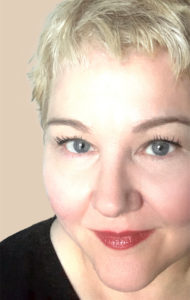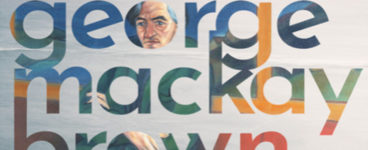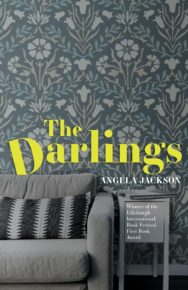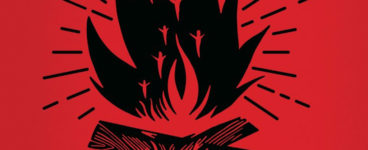‘I wanted to explore what [accidentally killing someone] might do to someone.’
When Mark Darling is fifteen years old, he is the golden boy, captain of the school football team, admired by all who know him. Until he kills his best friend in a freak accident. He spends the next decade drifting between the therapy couch and dead-end pursuits, then along comes Sadie. A story of how we often blinker ourselves to see a version of the truth that’s more palatable, we talk to Angela Jackson about her new book.
The Darlings
By Angela Jackson
Published by Eye and Lightning
 Well done Angela on the publication of The Darlings. Could you tell us a little more in what you wanted to explore in writing this story?
Well done Angela on the publication of The Darlings. Could you tell us a little more in what you wanted to explore in writing this story?
Thank you. At last!
I had two ideas rolling around my head at the outset. Having read a news piece about the subject, I kept mulling over what it would be like to live with the impact of accidentally killing someone. I wanted to explore what that might do to someone, where it might lead them. That was the germ of it, really. Secondly, I wanted to explore Carl Rogers’ assertion that we need to experience unconditional love in order to thrive. The protagonist, Mark Darling, is the product of those two ideas coming together. Mark clearly wants and needs to be loved for who he is, but he’s looking for it in all the wrong places. Just like us all, he is flawed and is capable of making the most terrible mess of things, which I think is what makes him interesting.
The Darlings is much-anticipated after the success of your debut, The Emergence of Judy Taylor. How was your experience of writing ‘the difficult second novel’?
I want to be very open about this, because I think there is too much opacity about being a writer and producing work that hits the required mark. There was no pressure on me to produce a first novel; I was working as a psychology lecturer and hardly anybody knew I was writing a book. The process of getting it published was fairly easy (I now realise how unusual that is) and following the lightest of edits — a couple of comments from my editor at the time — it was soon on the shelves, and it did very well. Which was when imposter syndrome kicked in. Almost overnight, I had a London agent and a publisher and a deadline, and was surrounded by people who’d gone to all the ‘right’ schools, people who seemed naturally confident and at ease in their own skin. Serious people. I convinced myself I that I wasn’t a ‘proper’ writer. So I headed back to uni to study for an MSc in Creative Writing. My editor and my agent both tried to convince me that I had everything I needed to produce a second novel, but I wasn’t convinced. I then spent a wretchedly miserable year having my natural writing voice quashed because it wasn’t ‘literary’ enough. I struggled to produce something ‘better’ than my debut novel (which, ironically, won Edinburgh International Book Festival’s First Book Award while I was on the course). Anyway, the first draft of The Darlings was awful; the strain and loss of confidence showed in every line. My agent asked where my natural voice had gone. It took me years to find it again.
The Darlings started life as a theatre show. Can you tell about adapting The Darling Monologues into the novel?
Actually, The Darling Monologues was an attempt to find my natural writing voice again, and to explore my characters in more detail. I already had that woeful first draft of The Darlings, but I needed to almost start again from scratch. It was so exhilarating to test my material a foot away from an audience and to experience their direct responses: tears and laughter and everything in between. Although it was terrifying, the confidence boost I got from it was immeasurable. That was the engine behind future drafts. I really enjoyed writing the monologues, and would love to do more stage/performance writing.
How has your previous work in psychology and education informed your writing career?
Teaching psychology to a group of lively young people, all of whom had other more exciting things they could have been doing, was a real test of my ability to hold an audience’s attention. My job was to make complex material engaging and straightforward. That’s essentially what I did with The Darlings (and with my first book); I wanted to explore serious issues in an engaging way.
Your books are very much character-driven. Who are the writers that you admire for their character work too?
I love Alan Bennett’s work, but who doesn’t. In Talking Heads, he managed to create a cast of nuanced, multi-dimensional characters who don’t feel written at all — they exist. A standout character from recent years that springs to mind is Elizabeth Strout’s wonderful Olive Kitteridge. I loved the book, and I also loved Frances McDorman’s screen portrayal of her. Helen Schulman’s characters always pull me straight in, as do Anne Tyler’s. I think what all these writers have in common, for me, is that they have the confidence to let the craft (all the work that has gone into creating their characters) remain offstage — their characters are allowed to breathe without any obvious reminder that you are reading words on a page. One of my favourite reviews of The Darlings is from a book blogger who said she was thinking about my characters as she did the dishes and while she was driving; I feel like I’ve hit the mark if I can make characters exist for someone other than myself.
The Darlings looks at issues such as childhood trauma, adultery, guilt and obsession, and yet explores these issues with a confident lightness of touch. Can you tell us more about the crafting of that balance?
Having lost my mum when I was seven, I’ve always been interested in the impact of loss and grief. I experienced it personally, obviously, and saw how it affected others around me. It’s part of the human condition, of course: we love and, eventually, we lose those we love. I found the best way to explore this was through writing. And therapy! So I can write confidently about the darker side of life because it’s far from unfamiliar to me. The humour comes naturally; it’s in my north of England DNA. I often feel like I have to clamp my mouth closed in certain situations because my response to darkness is to find the tiny crack where the humour leaks in. It’s a cliché but I genuinely coped with childhood trauma by making myself and other people laugh. I’m glad the balance seems crafted, but I have no insight into how I did that; it feels instinctive. Perhaps I cut some awful gaffes in the early drafts!
The acknowledgments in your novel mention a next book. Are you able to tell us anything about that yet?
I’ve been fortunate enough to have the support and encouragement of hugely talented writer, Melissa Bank. She made a suggestion for my third book, but it’s still in the early stages so it’s probably too soon to say anything meaningful about it. The most important thing Melissa did for me was to tell me how much she loved my writing — after that, I felt I was capable of anything.
Finally, what books have you been reading over the summer? What are you looking forward to reading next?
I currently have two great reads on the go: Sorrow and Bliss by Meg Mason and Summerwater by Sarah Moss. Small Pleasures is probably next, and I have Grace Paley’s selected short stories lined up after that. And I love to dip into anything by Samantha Irby — she is filters-off hilarious. I inhaled and continue to go back to Bonfire Opera, the most recent poetry collection by Danusha Laméris; it’s absolutely wonderful. I’ve been urging my uni students to read A Swim in a Pond in the Rain by George Saunders, which is fascinating and insightful. He wears his intellectual heft so lightly. It’s like he’s just kicking back having a coffee with you and going, ‘Hey, look what Chekhov did there — interesting, right? More cake?’ Brilliant. I’m also listening to Set the Boy Free by Johnny Marr, narrated by the lovely man himself. I remember seeing him play Princes Street Gardens a few years ago in the most torrential rain and realising that absolutely nothing could dilute his magic.
The Darlings by Angela Jackson is published by Eye & Lightning Books, priced £8.99.
ALSO IN THIS ISSUE

 Beyond the Swelkie
Beyond the Swelkie
‘Quiet meditations, the start of a lovely dawn / broken, piece by piece as day breaks.’














